-
West Africa’s Ebola-affected countries face Zika threat
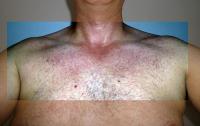
Rapid testing for the Zika virus is a critical need in the recent Ebola-affected countries of Liberia, Sierra Leone, and Guinea because of the recent Zika outbreak on nearby Cape Verde and the similarity in symptoms between Zika and early Ebola, experts say.
-
-
Global warming increases rainfall in world's driest areas
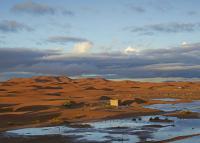
Global warming will increase rainfall in some of the world’s driest areas over land, with not only the wet getting wetter but the dry getting wetter as well — a phenomenon that could lead to more flash flooding.
-
-
EU, Liberian experts assess the country’s needs to mitigate CBRN threats
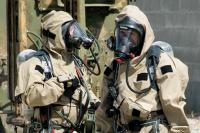
From March 7 to 9, Liberian and European Union specialists have gathered to proceed to the identification of needs in order to strengthen the country’s system to deal with threats emanating from Chemical, Biological, Radiological and Nuclear agents and materials.
-
-
AUC welcomes Ghana’s decision to introduce visa-on-arrival for AU states’ citizens

The Chairperson of the African Union Commission (AUC), Dr. Nkosazana Dlamini Zuma, has welcomed Ghana’s decision to introduce a visa-on-arrival policy for citizens of African Union Member States. The President of Ghana, H. E. John Dramani Mahama, announced the decision in his State of the Nations address to the Ghanaian Parliament on 25 February 2016.
-
-
Four African innovators selected for engineering innovation prize
Following an open, competitive, application process which saw entries from fifteen countries in sub-Saharan Africa, twelve African entrepreneurs were chosen to receive a package of six months of business training and mentoring from the U.K.’s Royal Academy of Engineering. The four finalists showing the greatest promise have now been chosen, and are in with a chance to become the overall winner. Each will receive at least £10,000 with the grand prize of £25,000 to be awarded at a ceremony in Cape Town on 1 June. A low-cost sustainable water filter system to provide clean and safe drinking water, and a service that allows African mobile phone users to switch easily between multiple mobile networks are among the four African innovations selected by the Academy.
-
-
Sahel youths susceptible to radicalization: UN envoy
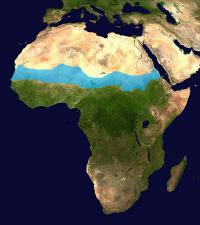
Hiroute Guebre Sellassie, UN envoy to the Sahel region in Africa, said last week that up to forty-one million young people in the Sahel have nothing hut a bleak future to look to, pushing them to migrate and making them susceptible to radicalization. She said that young people under age 25 in Burkina Faso, Chad, Mali, Mauritania, and Niger “face hopelessness.” She noted that 44 percent of children in the Sahel lack access to primary education and only 36 percent of the population can read or write.
-
-
Climate change impact on food production could cause 500,000 extra deaths in 2050
Climate change could kill more than 500,000 adults in 2050 worldwide due to changes in diets and bodyweight from reduced crop productivity. The research, published yesterday in The Lancet, is the strongest evidence yet that climate change could have damaging consequences for food production and health worldwide. The study found that by 2050, reduced fruit and vegetable intake could cause twice as many deaths as under-nutrition, and that three-quarters of all climate-related deaths due to changes in food production are estimated to occur in China and India.
-
-
Water storage strategies in Sub-Sahara Africa
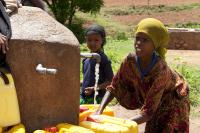
Direct abstraction of water from rivers through ponds and pumping devices seems the most attractive water storage option in Ethiopia. However, the funding agencies that may be interested in investing in such a storage system have to consider that better access to credit, and clear abstraction policies should be ensured.
-
-
French Special Forces join fight against ISIS in Libya
French Special Forces are among commando units operating on the ground in Libya against ISIS. A small French force has been operating out of Benghazi’s Benina airport, assisting forces of the internationally backed Libyan authorities in Tobruk. The Pentagon has said that in the absence of a unity government, U.S. Special Forces have been “partnering” with different militias for attacks on ISIS militants.
-
-
U.S. to fly armed drone attacks from a base in Sicily against ISIS in Libya
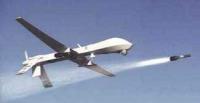
Italy said it would allow armed U.S. drones to be based in an American base in Sicily so they would be within to launch attacks against ISIS militants in Libya and other northern Africa countries. The agreement was reached after years of negotiations, and against the backdrop of intensified ISIS activity in Libya and other African countries.
-
-
Asia, Middle East lead rise in 2015 arms imports
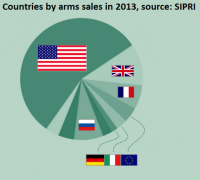
The volume of international transfers of major weapons has grown continuously since 2004 and rose by 14 percent between 2006 and 2010 and 2011–2015, according to new data. Six of the top ten largest arms importers in the 5-year period 2011–15 are in Asia and Oceania. Arms imports by states in the Middle East rose by 61 percent between 2006 and 2010 and 2011 and 2015.
-
-
Integrating markets to offset climate-related food insecurity
Global market integration is key to buffering future commodity prices and food security from the negative effects of climate change on agriculture. Rising temperatures and an increase in extreme weather events will likely have adverse impacts on global crop production, leading to higher food prices and food scarcity. But global markets that have the ability to deliver food where it is needed most could help offset these consequences.
-
-
Ebola crisis provides framework for how to respond to outbreaks like Zika virus
As world leaders grapple with containing the Zika virus, the Ebola epidemic in West Africa provides valuable lessons for how to respond to other infectious disease epidemics, according to a just-published policy report. Rebuilding local health care infrastructures, improving capacity to respond more quickly to outbreaks and considering multiple perspectives across disciplines during decision-making processes are among the key recommendations the authors propose.
-
-
The little-understood connection between Islamic terror and drug profits

Terrorists are in it as much for the loot as for the ideology. The Islamic State, or ISIS, could hardly exist, whatever its Islamist fervor, without hard cash from sales of pilfered petroleum, taxes on its subject population and kidnappings for ransom. Likewise ISIS- and al-Qaeda-linked groups in Africa prosper by trafficking drugs across the Sahara and by offering “protection” to smugglers who have long been trading illicit goods throughout the continent. Although Westerners tend to think of these groups as driven by ideology, new recruits may be more attracted by opportunities to make money. Combating terror in Africa, at least, now depends as much on cutting off insurgents from their sources of income as it does on defeating them on the battlefield – a much longer, tougher, and more costly pursuit.
-
-
Boko Haram burns children to death in attack on Nigerian village
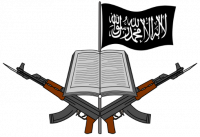
Boko Haram Islamist extremists have burned children to death in an attack on the Nigerian village of Dalori Saturday evening. In all, sixty-five people died in the attack. The militants set the buildings on fire, and as the fire spread, they shot people who were attempting to escape the flames.
-
- All
- Regional
- Water
- Biometrics
- Borders/Immig
- Business
- Cybersecurity
- Detection
- Disasters
- Government
- Infrastructure
- International
- Public health
- Public Safety
- Communication interoperabillity
- Emergency services
- Emergency medical services
- Fire
- First response
- IEDs
- Law Enforcement
- Law Enforcement Technology
- Military technology
- Nonlethal weapons
- Nuclear weapons
- Personal protection equipment
- Police
- Notification /alert systems
- Situational awareness
- Weapons systems
- Sci-Tech
- Sector Reports
- Surveillance
- Transportation
Advertising & Marketing: advertise@newswirepubs.com
Editorial: editor@newswirepubs.com
General: info@newswirepubs.com
2010-2011 © News Wire Publications, LLC News Wire Publications, LLC
220 Old Country Road | Suite 200 | Mineola | New York | 11501
Permissions and Policies
Editorial: editor@newswirepubs.com
General: info@newswirepubs.com
2010-2011 © News Wire Publications, LLC News Wire Publications, LLC
220 Old Country Road | Suite 200 | Mineola | New York | 11501
Permissions and Policies
